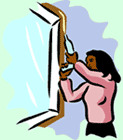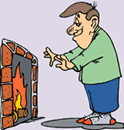|
|
|

1-888-8 PUEBLO (1-888-878-3256)
       
|
|
Home
> Consumer
Focus Archive > Purchasing Appliances > Heating Your Home
 |
Consumer Focus: Purchasing Appliances
This is an archived document. |
 |
Heating Your Home
 The average household spends $1,500 a year on energy bills, nearly half of which goes to heating and cooling. Read these tips to learn how insulation, weatherization, and use of Energy Star products can save you money. We also have advice on how to heat your home safely and what to do if you are having trouble paying your energy bill.
The average household spends $1,500 a year on energy bills, nearly half of which goes to heating and cooling. Read these tips to learn how insulation, weatherization, and use of Energy Star products can save you money. We also have advice on how to heat your home safely and what to do if you are having trouble paying your energy bill.
Find out what the average household spends in 2008 on heating bills.
Posted: November 16, 2004
Updated: September 12, 2008
Top |
 |
 Energy Efficiency
Energy Efficiency
Insulation
- Check to see whether your home has appropriate insulation for your climate. This could reduce your heating costs up to 30%.
- The R-value of insulation refers to its ability to resist heat transfer. The lower the number, the faster the heat loss. R values should range from 20 to 30 in walls and 50 to 70 in ceilings.
- Windows are a major source of heat loss. When replacing windows, look for ones with the ENERGY STAR label. They can reduce heating costs up to 15%.
- Windows are assigned a U-value. The lower the U value, the better the insulation. A U value of .35 or below is recommended in colder climates.
- Double - paned windows and low - emissivity (low-E) coatings reduce the amount of heat that flows through glass. Less heat is lost in the winter, and less heat enters your home in the summer with these types of windows.
Weatherization
- Hold a tissue around different sections of your door and window frames. If the tissue waves, you have a draft. Use caulk to fill any gaps between walls and frames.
- Before you start, remove any old caulk using a putty knife. Be sure to caulk in one continuous stream. Avoid stopping and starting.
Other ways to save energy and money
- You can purchase Energy Star heating equipment, or even better, an entire Energy Star Home! They feature high performance windows, advanced insulation and sealing, and high efficiency appliances, heating, and cooling systems.
- Keep your fireplace damper closed. Since heat rises, an open damper allows heat to escape from your home.
- Use fireplace grates made of C shaped metal tubes. They draw cold air into the fireplace and circulate hot air into the room.
- Close your curtains at night to reduce the chill you feel from cold windows. Insulating curtains are also available.
- Set your thermostat as low as is comfortable
- Clean or replace furnace filters once a month or as needed.
- Make sure warm air registers are not blocked by furniture or drapes.
Top |
 |
 Energy Assistance $
Energy Assistance $
Top |
 |
 Safety
Safety
The Consumer Product Safety Commission reports that annually there are thousands of fires and hundreds of deaths associated with portable heaters, fireplaces and chimneys. So it’s vital to make sure your money – saving ideas are also safe.
Space Heaters
- Place the heater on a level, hard, nonflammable surface, not on rugs or carpets or near bedding or drapes. Keep the heater at least three feet from bedding, drapes, furniture, or other flammable materials.
- Never leave a space heater on when you go to sleep. Never place a space heater close to any sleeping person.
- Turn the space heater off if you leave the area. Keep children and pets away.
Fireplaces
- Have flues and chimneys inspected before each heating season. Blockage by debris could cause smoke to enter the room, or worse, cause a chimney fire.
- Open the fireplace damper before lighting the fire and keep it open until the ashes are cool. This prevents the build up of poisonous gases, which can be especially dangerous when your family is sleeping.
- Keep a screen or glass enclosure around a fireplace to prevent sparks or embers from igniting flammable materials.
Top |
 |
Other
Resources
This is just a brief overview.
For more information, check out these resources:
Read
these publications online or order them from FCIC:
Websites*:
* Names of resources and organizations
included in this online article are provided as examples only,
and their inclusion does not mean that they are endorsed by
the Federal Citizen Information Center or any other Government
agency. Also, if a particular resource or organization is not
mentioned, this does not mean or imply that it is unsatisfactory.
*If you click
on these links, you are leaving FCIC's website. Please bookmark
us before you leave so you can return easily. FCIC is not responsible
for the content of these websites.
Top |
 |
|
We will not retain
or use this information for any other purpose. |
 |
|
For
more information on other popular consumer issues check out
FCIC's Consumer Focus Archive.
Top |
|
|
 The average household spends $1,500 a year on energy bills, nearly half of which goes to heating and cooling. Read these tips to learn how insulation, weatherization, and use of Energy Star products can save you money. We also have advice on how to heat your home safely and what to do if you are having trouble paying your energy bill.
The average household spends $1,500 a year on energy bills, nearly half of which goes to heating and cooling. Read these tips to learn how insulation, weatherization, and use of Energy Star products can save you money. We also have advice on how to heat your home safely and what to do if you are having trouble paying your energy bill.

